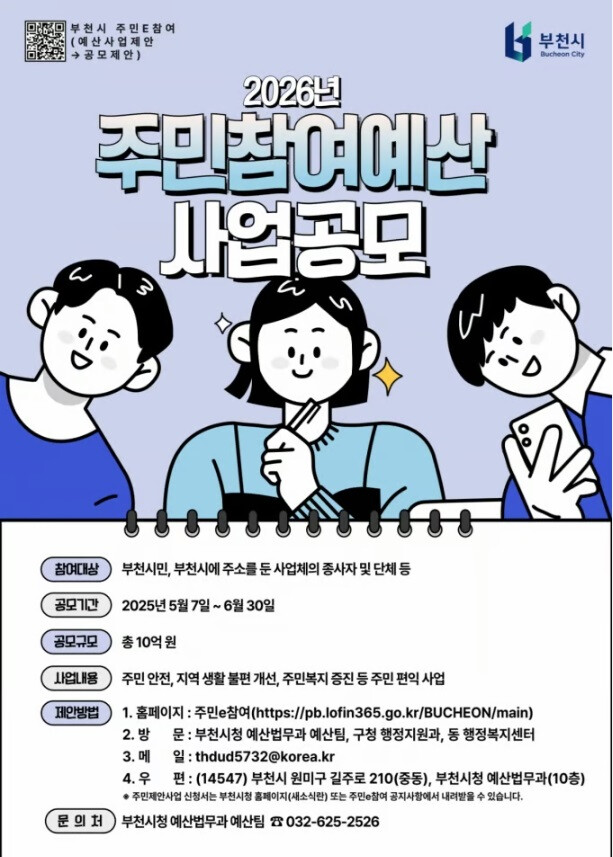
Bucheon City, Gyeonggi Province, South Korea, has announced its call for proposals for the '2026 Resident Participation Budget Project,' inviting citizens to contribute their innovative ideas to municipal administration and actively engage in the budget allocation process. The initiative, announced on May 7th, underscores the city's commitment to fostering a more inclusive and citizen-centric governance model.
The proposal submission period commences on the announcement date and will continue until June 30th. A substantial budget of 1 billion Korean Won (approximately $750,000 USD based on current exchange rates) has been earmarked to fund projects directly proposed by the city's residents. This significant allocation highlights Bucheon's dedication to empowering its citizenry in shaping the future of their community.
Eligibility for participation is broad, encompassing any individual residing, working, or affiliated with an organization within Bucheon City. The call encourages the submission of creative project ideas aimed at enhancing the quality of life for residents, addressing local inconveniences, and promoting overall community welfare. This inclusive approach ensures that a diverse range of perspectives and needs are considered in the city's developmental planning.
However, certain categories of proposals are excluded from consideration. These include projects requiring exorbitant budgets, those posing significant long-term maintenance or management challenges, initiatives deemed to be purely for consumption without lasting impact, and proposals that primarily serve the interests of specific individuals or organizations. These exclusions are in place to ensure the fiscal responsibility and broad community benefit of the selected projects.
Residents can conveniently submit their proposals through various channels. The 'Resident e-Participation' website offers a digital platform for submissions, while electronic mail, postal service, and in-person visits to designated city offices are also viable options. Application forms are readily available for download on the Bucheon City website's 'News' section, ensuring easy access for all interested participants.
The selection process for the submitted proposals will involve a dual evaluation system. A dedicated committee will assess the proposals, accounting for 60% of the final evaluation. The remaining 40% will be determined through an online resident vote, providing the broader Bucheon community with a direct say in which projects are ultimately funded. This hybrid approach aims to balance expert evaluation with popular support, ensuring that the selected projects are both feasible and aligned with the needs and desires of the city's inhabitants.
Lee Jae-woo, Head of the Planning and Coordination Office of Bucheon City, emphasized the significance of the initiative, stating, "The resident participation budget system is a valuable opportunity for citizens to participate as key stakeholders in the city's administration. We encourage the active interest and participation of our residents so that their everyday ideas can be reflected in the city's policies." His remarks underscore the city's commitment to genuine citizen engagement and its belief in the power of grassroots innovation to drive positive change.
This initiative by Bucheon City aligns with a growing global trend towards participatory budgeting, a democratic process that allows citizens to directly decide how a portion of public funds is spent. By involving residents in the decision-making process, Bucheon aims to foster greater civic engagement, enhance transparency in governance, and ensure that public resources are allocated in a manner that best addresses the needs and priorities of the community.
Participatory budgeting has been implemented in various forms and scales across numerous cities and countries worldwide, often leading to increased citizen trust in government and the development of projects that are more responsive to local needs. Research suggests that such initiatives can lead to more equitable resource allocation and a stronger sense of community ownership over public projects.
Bucheon's allocation of 1 billion KRW for citizen-proposed projects demonstrates a significant commitment to this democratic principle. The multi-channel submission process and the blend of committee review and public voting are designed to ensure accessibility and fairness in the selection process. By actively soliciting and valuing the input of its residents, Bucheon is taking a proactive step towards building a more collaborative and responsive urban environment.
The types of projects that could emerge from this initiative are diverse, potentially ranging from improvements to local parks and public spaces to the development of community programs, enhancements to transportation infrastructure, and the implementation of sustainable environmental initiatives. The focus on addressing local inconveniences and promoting resident welfare encourages proposals that have a tangible and positive impact on the daily lives of Bucheon's citizens.
The exclusion criteria are crucial for ensuring the feasibility and sustainability of the funded projects. By avoiding proposals that are excessively costly, difficult to maintain, or narrowly focused, Bucheon aims to maximize the long-term benefits of the participatory budgeting process for the entire community.
The two-month proposal submission window provides ample time for residents to develop their ideas and prepare their submissions. The subsequent evaluation process, combining expert assessment and public input, is designed to be thorough and fair. The transparency of the process, with clear guidelines and accessible submission methods, is essential for building public trust and encouraging broad participation.
Bucheon's initiative serves as a model for other municipalities seeking to deepen citizen engagement and enhance the democratic nature of local governance. By empowering residents to directly influence budget allocation, Bucheon is fostering a stronger sense of civic responsibility and creating a more vibrant and responsive community. The success of the '2026 Resident Participation Budget Project' could have significant implications for how local governments in South Korea and beyond engage with their citizens in shaping the future of their communities. The anticipation is high for the innovative and impactful projects that will emerge from the collective wisdom and creativity of Bucheon's residents.
[Copyright (c) Global Economic Times. All Rights Reserved.]






























